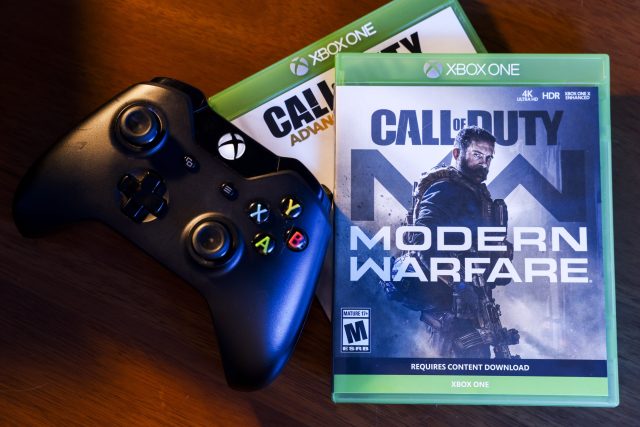An absence of trust–
“Our organization would never ever recuperate,” Sony officer states of possible second-rate variation.
Kyle Orland
–

Increase the size of / Artist’s conception of what Sony believes the next Call of Duty may appear like on the PS5 (and certainly not a screenshot from Call of Duty 2 on Xbox 360. Nope. No chance).
Activision
Late last month, UK regulators stated they no longer thought a proposed Microsoft-owned Activision would disallow Call of Duty video games from PlayStation platforms, a turnaround of earlier initial findings. Even if you approve that property, however, Sony states that it’s still anxious Microsoft might offer PlayStation owners a “abject” variation of brand-new Call of Duty video games in an effort to make the Xbox variations look much better.
“Simply … making it as great as it might be”
In a freshly released reaction to the UK’s Competition and Markets Authority, Sony states the regulators’ current turn-around is “unexpected, extraordinary, and illogical.” The business takes particular problem with the regulators’ “life time worth” modeling, which Sony states greatly underestimates what an Xbox-exclusive Call of Duty would deserve to Microsoft.
Beyond those technical issues, however, Sony states it frets that Microsoft may discreetly weaken PlayStation “just by not making it as excellent as it might be.” That might consist of little modifications to the video game’s “efficiency [or] quality of play,” however likewise secondary transfer to “raise [Call of Duty’s] cost [on PlayStation]launch the video game at a later date, or make it offered just on Game Pass.” Microsoft would likewise “have no reward to utilize the innovative functions in PlayStation not discovered in Xbox,” Sony states, an evident referral to the PS5 controller’s innovative haptics and integrated audio abilities.
In its own recently submitted reaction, Microsoft repeated that it has “no objective to keep or break down access to Call of Duty or any other Activision material on PlayStation.” That follows on a March filing where Microsoft guaranteed Sony parity on Call of Duty’s “release date, material, functions, upgrades, quality, and playability.”
Sony’s action shows an ongoing absence of trust in such guarantees. The business mentions in-depth analyses from the similarity Digital Foundry in stating that “the technical quality of Modern Warfare II was comparable throughout platforms” in today’s market. After a merger, however, Sony argues that “Microsoft would have various rewards since breaking down the experience on PlayStation would benefit Xbox, PlayStation’s ‘closest competitor.'”
A Digital Foundry video that discovers existing variations of Call of Duty carry out likewise throughout PlayStation and Xbox platforms.
This sort of “partial foreclosure” technique may “set off less player problems” than complete Xbox exclusivity for Call of Duty, Sony states, while likewise permitting Microsoft to “still protected incomes from sales of Call of Duty on PlayStation for a transitional duration.” Sony states the long-lasting outcomes of this kind of “abject” PlayStation variation would be the exact same as a complete PlayStation restriction: Call of Duty gamers deserting Sony and moving to Microsoft’s platforms.
Such a relocation would “seriously harm our credibility,” Sony Interactive Entertainment CEO Jim Ryan informed the CMA in a current hearing. “Our players would desert our platform in droves and network impacts would intensify the issue. Our organization would never ever recuperate.”
“Attuned to quality”
This isn’t the very first time Sony has actually revealed issues over PlayStation getting a “even worse” Call of Duty offer. In early March, Sony fretted about the financial rewards of working out a Call of Duty licensing charge with a Microsoft-owned Activision. “Today, Activision is incentivized to reach an arrangement with [Sony] to disperse Call of Duty,” the business composed. After a merger, however, Microsoft-owned Activision “would take advantage of a failure to disperse Call of Duty on PlayStation,” Sony stated.
Sony likewise argued in March that these type of platform parity concerns “might emerge even without an active choice on the part of Microsoft to deteriorate Call of Duty on PlayStation.” Microsoft may be “incentivized to support and focus on advancement of the Xbox variation of the video game, such as by utilizing its finest engineers and more of its resources.”

Expand / Sony stresses that Call of Duty ownership will be a reliable “lever” over console competitors for Microsoft.
Getty Images|Bloomberg
In its March upgrade, the UK’s CMA stated it discovered these sort of arguments from Sony typically unpersuasive. “We have actually provisionally concluded that, although such methods might break down PlayStation’s offering to some level, they would not materially impact its capability to complete,” the regulators stated.
Sony argues back that even a little distinction in Call of Duty quality, accessibility, or cost in between the platforms might “rapidly damage [Sony’s] track record and trigger a loss of engagement and of gamers.”
“It is challenging to envisage a market where customers are more attuned to quality and where quality impacts acquiring choices,” Sony composes. “Call of Duty players are enthusiastic, experienced, and advanced. Players engage with each title in the franchise right away after its release, are acutely knowledgeable about a video game’s rate, quality, and functions, and frequently compare the quality, efficiency, and functions of their preferred video games throughout PlayStation and Xbox.”
We’ll see if those sort of arguments are eventually convincing when the CMA launches its last report, which is due by the end of April.

